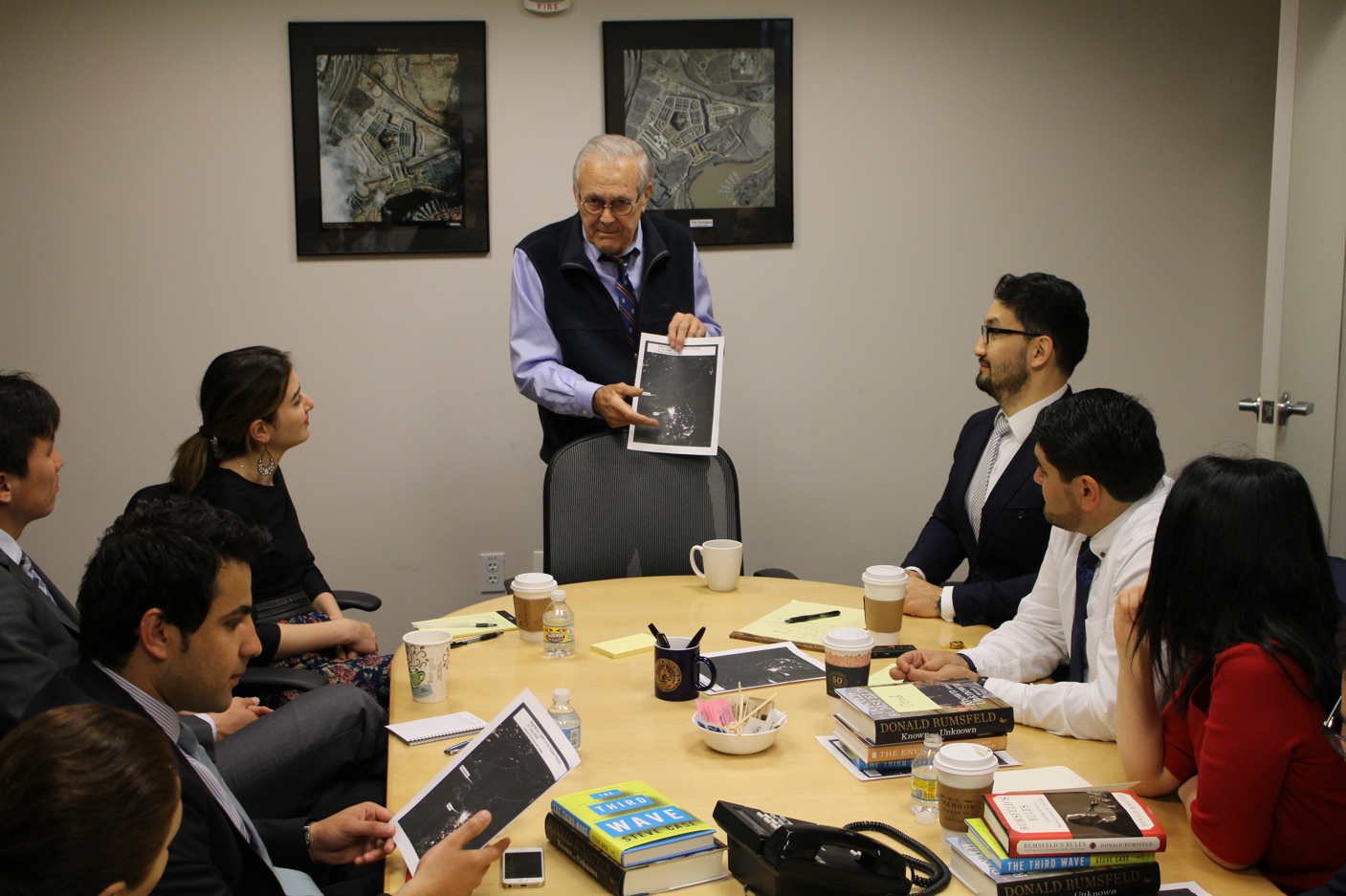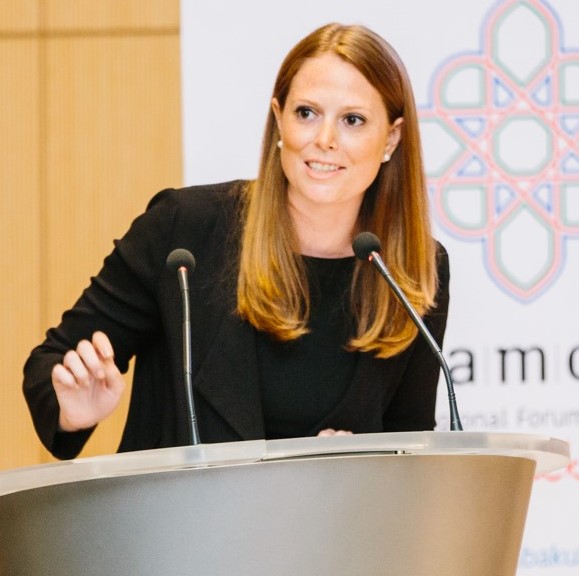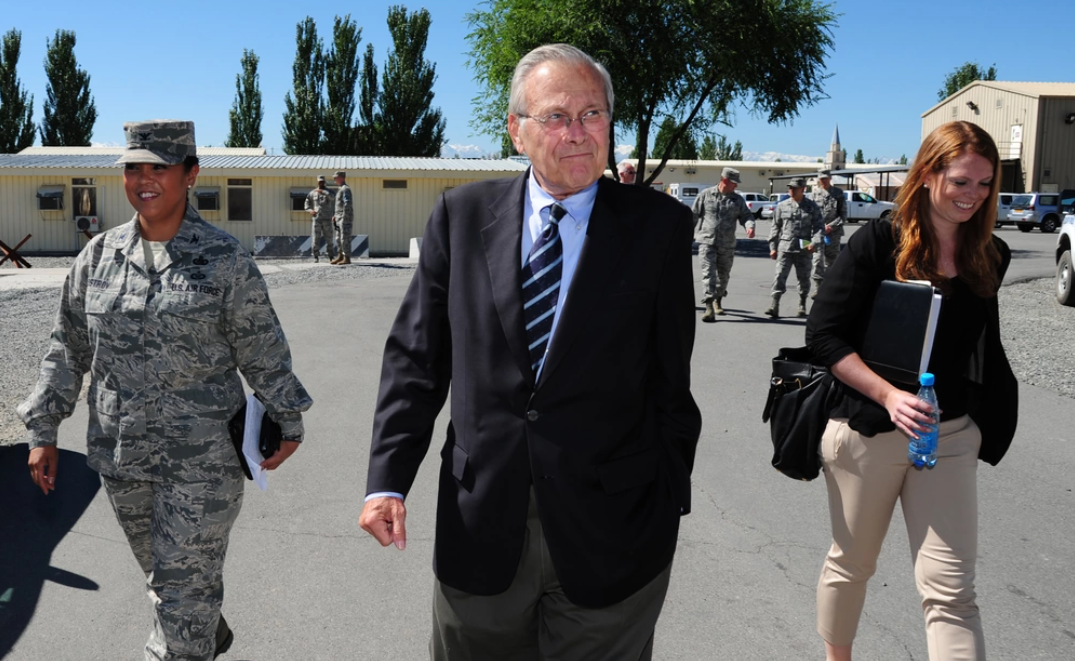We are delighted to have Sarah Tonucci, our Executive Director, join us for an interview for our latest blog post. Sarah has been involved with the Foundation since 2009 and has led the Foundation in her current role for the past 11 years, working closely with Secretary Rumsfeld to advance our mission and develop our programs. Compiling a collection of her commentary at our recent events and some additional responses for this interview, to follow are some of Sarah’s insights on the Foundation’s trajectory over the past decade, the Secretary’s vision for our programs and more on where the Foundation is headed in this next chapter.
Secretary Rumsfeld was always one to embrace change and innovation where it was needed. When new ideas came across his desk, he was eager to hear more and, often, to try them out. The same went for his approach to the Foundation’s work. After establishing both Fellowship Programs, Rumsfeld was consistently focused on taking stock of our progress and assessing what was working, what wasn’t and what could be done better. This was more broadly reflected in the evolution that occurred within the missions and goals of both of our Fellowship Programs in the early years of their development.
.
Can you describe how the goals of the CAMCA Fellowship Program evolved over time?
“The idea that the Fellows were all getting connected is what he (Rumsfeld) really saw as the true potential of the network. And I think over time, while he thought those other elements of that U.S.-CAMCA linkage was beneficial and is beneficial, really what he felt most strongly about was the network element… That element of this being such a disconnected region and the opportunity to bring these bright rising leaders together is really what motivated him to be so focused on this area.”
Hear Sarah speak more about the stages of evolution of the CAMCA Fellowship’s mission here:
Turning to the Graduate Fellowship Program, can you share about the evolution of the goals of that effort?
The progression of the goals of the Graduate Fellowship Program, maybe now not so surprisingly, followed in a similar trajectory to those of the CAMCA Fellowship Program. The Graduate Fellowship’s primary goal at its outset was to provide financial assistance to talented students interested in public service who would otherwise not be able to afford graduate studies on their own. An important part of that mission was encouraging bright, exceptional students to seriously pursue their interest in public service. Secretary Rumsfeld was concerned that public service was not often encouraged and highly regarded in academia, and thus saw value in providing targeted support to impressive graduate scholars who had a desire to serve our nation. After a few years of providing these individual grants, a small group of Fellowship alumni had developed. To the Secretary and our team, it seemed that a natural and beneficial next step might be providing an opportunity for these talented young professionals, many with mutual interests and career goals, to all meet one another and connect. From there, the Fellowship’s annual conference was born. After that initial “pilot” gathering back in 2012, it was clear that there was notable potential in the budding professional and personal relationships that were developed among the group. The incentive to serve, initially encouraged by financial support, was now being reinforced by a community with shared values and a dedication to our country and its role as a leader in the world. Since then, while our traditional model of financial support through our Fellowship grants has continued, developing and connecting our Alumni Network has become a major focus and aim of our work.
Now approaching this next phase of the Foundation’s development, what was Secretary Rumsfeld’s vision for both programs in the decade ahead?
Secretary Rumsfeld would often use the word “energy” when talking about our Fellowship networks and his impression of what was occurring among them after he would spend some time with our Fellows. Thus, after seeing the energy of both of our Fellowship networks grow over the years, he was excited about the prospect of both networks becoming empowered communities of like-minded individuals that could be mutually beneficial to one another. With these talented and motivated rising leaders being connected and developing lasting bonds, he was quite optimistic about both the future of our country and the future of the countries of the CAMCA region.
He also felt strongly that our alumni across both programs were absolutely the best resources to help steer the future direction of our networks and he continually encouraged us to seek their feedback, guidance and direction for new initiatives. Often when Rumsfeld would meet with Fellows and they would try and pick his brain and ask him, “What are you really hoping to get out of this? What do you want from us in return?” he would turn that question right back on them and say, “What do you want it to be?” In short, he was insistent that the future of both networks be driven by the Fellows themselves.
Hear Sarah speak in more detail on Secretary Rumsfeld’s desire for the evolution of our programs to be led by our alumni:
What are some recent program accomplishments and initiatives that you think Secretary Rumsfeld would be most excited about?
In alignment with his vision for our alumni to have an important say in where our work is headed, we are delighted that some significant strides have recently been made in this direction.
With regards to our CAMCA Fellowship – our alumni have developed their own entity, the CAMCA Network, complete with a governing Board and mission statement. The CAMCA Network Board, its main leadership body, features a representative from each CAMCA country and works to facilitate the network’s initiatives and activities across the region. (You can learn more about the Board here.)
Within the CAMCA Network, sector-based working groups have also been established that unite members that are interested to cooperate on joint projects in their areas of mutual expertise. Rumsfeld was always particularly excited to hear about any joint ventures and projects among Fellows, particularly in the business realm, believing that private sector cooperation could often break through certain barriers where governmental cooperation could be difficult. Many of these initiatives have grown into fruitful efforts like a regional virtual lecture series for students, joint professional development workshops, alumni expanding their companies to other countries in the region, and much more.
Turning to our Graduate Fellowship – our alumni network is newly headed by a dedicated leadership body, the Alumni Leadership Council, the members of which provide essential feedback to our staff and Board and help shape our alumni programming so that it is of most value to our members.
I also know Secretary Rumsfeld would have been particularly delighted to see the launch of one of our latest developments within the Graduate Fellowship Network: a Fellow-led mentorship initiative called Network Connect. It was always his hope that more seasoned alumni, after becoming better established in their careers, would offer their advice and support to newer Fellows. Now 13 years into the program, we’ve developed an impressive cadre of alumni that have now risen to significant ranks and leadership roles – journal editors, associate professors, senior analysts and consultants, vice presidents, executive directors, senior fellows, platoon leaders and more – who have valuable experience to offer helpful guidance to Fellows just coming out of graduate school or looking to make career transitions. We are pleased to have made a number of initial mentor-matches this year and our alumni have expressed their excitement about this opportunity to give back to the network and to help the next generation of Fellows in their public service pursuits.
Finally, we have been excited to launch annual alumni awards for both of our programs showcasing the accomplishments of alumni who have gone above and beyond in service to their respective alumni network and/or to their country. The idea of launching something of this sort was a topic that Secretary Rumsfeld and I had brainstormed about being a meaningful way to acknowledge the significant contributions that were happening among our networks. I know he would have been pleased to celebrate the accomplishments of our awardees and would appreciate that we are finding ways to give them the honor and recognition they deserve for their efforts and impact in their communities.
What are some of your favorite memories of Secretary Rumsfeld interacting with Fellows?
He really delighted so much in spending time with Fellows, and I think all of our Fellows could really feel that when they interacted with him. Often during those meetings, someone from our staff would come in and try to interrupt to let him know that his next appointment was waiting, and he would wave them off because he really preferred to spend time with the Fellows instead. He’d want to hear about their backgrounds and families, to learn about what they were doing and why, and to ask where they were headed and what they wanted to accomplish. He enjoyed offering advice, and where he wasn’t an expert, he always sought to connect them with someone from his own network who was. He was genuinely interested in people, and our Fellows were no exception, and it was very typical for him to go out of his way to be of particular assistance to each Fellow that he met.
One of his favorite parts of visits was to show Fellows around his office which was full of unique, historic memorabilia. He would always pay special attention to one photo (pictured below) – a satellite picture of the Korean peninsula taken at night, which warranted an important stop on the office tour. He would explain that the photo sat on his desk at the Pentagon to remind him of the impact and vibrancy of free systems and the importance of fighting for those freedoms. In the context of the tour, the photo served as a visual representation of why we do what we do at the Foundation: supporting rising leaders that are committed to upholding and advocating for such critical freedoms across the world.

Why do you think Secretary Rumsfeld was so invested in these programs?
Hear Sarah describe what drove Rumsfeld’s passion for our work here:
What else do you want our friends and followers to know about Secretary Rumsfeld as it relates to the Foundation?
As was touched on earlier, Secretary Rumsfeld really understood the power that a strong network could have. It is an understatement to say that he greatly valued the people within his own network, his friendships, and the support that he received from them. He was incredibly grateful to all the people that contributed to the Foundation’s development and efforts – our Board members, friends and colleagues who provided advice and counsel, speakers who spent time with and supported our Fellows, generous donors and more. Our programs are undoubtedly rooted in Rumsfeld’s mindset of giving back and paying it forward, from the personal to the national level, and the support our programs have received since our founding reflects that.
Lastly, the Foundation’s work is, at its core, a unique product of the Rumsfelds’ lifetime of experiences from many decades working across sectors, including roles both military and civilian, domestic and international, legislative and executive. The Rumsfelds thought and cared deeply about the causes that we champion. At first glance our focus areas might seem distinct or even somewhat unrelated, but with a closer look, common themes and core tenets emerge. They believed in empowering young, talented people to step up and to lead, as they were once encouraged and supported by others. The way our programs are designed and run is steeped in the values that they held – from the power of the individual to honoring service to nation and encouraging leadership. It will come as no surprise, as someone known for his meticulousness and deep thinking, that Secretary Rumsfeld was deeply invested and engaged in every aspect of the Foundation and our work. It was a true passion project, born out of his gratitude for a lifetime full of opportunity and a desire to provide such opportunity to others.
 Learn more about our Executive Director in her full bio here. In the cover photo, Sarah is pictured at the right of Secretary Rumsfeld during their tour of the Manas Transit Center in the Kyrgyz Republic in June of 2013.
Learn more about our Executive Director in her full bio here. In the cover photo, Sarah is pictured at the right of Secretary Rumsfeld during their tour of the Manas Transit Center in the Kyrgyz Republic in June of 2013.


